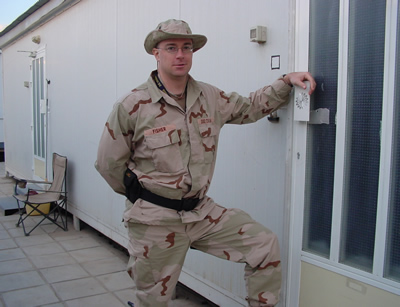|
||||||||
Iraq Book Excerpt 3 - Halliburton It was soon after arrival that I first started to realize the all-encompassing power U.S. government contractors held over life in the camps. I would eat in a mess hall controlled by Halliburton subsidiary KBR (Kellogg, Brown and Root), the Vice-President’s former company. I would sleep in a KBR trailer in a KBR bed with my government-issued clothes kept in a KBR closet. I would shower and shit in a KBR latrine, do my laundry in a KBR trailer, and go to see a KBR doctor in a KBR hospital when I got sick. My food was brought in by KBR and served by labor imported by KBR from India, Nepal and the Philippines. The gym, movie theater, and Internet connections were all controlled by Halliburton. Failure to follow Halliburton rules could get you in trouble with Halliburton security and banned from Halliburton facilities – all separate from whatever job you were doing in the warzone that should, in theory, take precedence over private contractors and war profiteering. While the term ‘war profiteer’ may seem out of line, hear me out. Several weeks after I arrived at the camp, and in response to the rocket and mortar attacks, the Brits and Aussies ordered all of their personnel out of our quarters and into separate living facilities with ceilings hardened against the incoming fire. The Halliburton buildings, with their flimsy trailer park roofs, were deemed too unsafe for British and Australian soldiers and civilians. The cost of getting some bags and filling them with the plentiful local sand, thus hardening the roofs of the trailers where U.S. soldiers and civilians lived, was deemed too expensive – leaving the buildings and anyone inside vulnerable. One wonders how many people will have to be killed in a mortar attack before Halliburton profits give way to U.S. lives. To save the cost of some bags and a few roof reinforcement bars, U.S. personnel live unprotected, while the Brits and Aussies live in hardened buildings, joking about the Halliburton bonus that must surely await VP Cheney when he returns to the private sector. Of course I didn’t volunteer to go to a warzone because I wanted to be safe. No one does. Nor do I fail to see the expense that would be involved in protecting the far larger U.S. contingent in the same way the Brits and Aussies are protected. |
||||||||
My point however, is that when I hear some politician on TV going on about how, “everything possible is being done to protect American servicemen and women in Iraq,” I can’t help but feel they are either lying or sorely mistaken. “Everything” is not being done to protect Americans in Iraq, not even close. And, just like with the lack of up-armored HUMVEEs-issue a couple of years ago, it’s either going to take an embarrassing question from a G.I. at a press conference, or some deaths from a rocket attack on a trailer park, before “everything possible” will include putting sandbag protection over the trailers where my friends and colleagues live. No matter your acceptance of the term ‘war profiteer’, when it comes to protection vs. profits the winner in this case has clearly been profits. |
 Standing outside my trailer |
|||||||
|
||||||||

